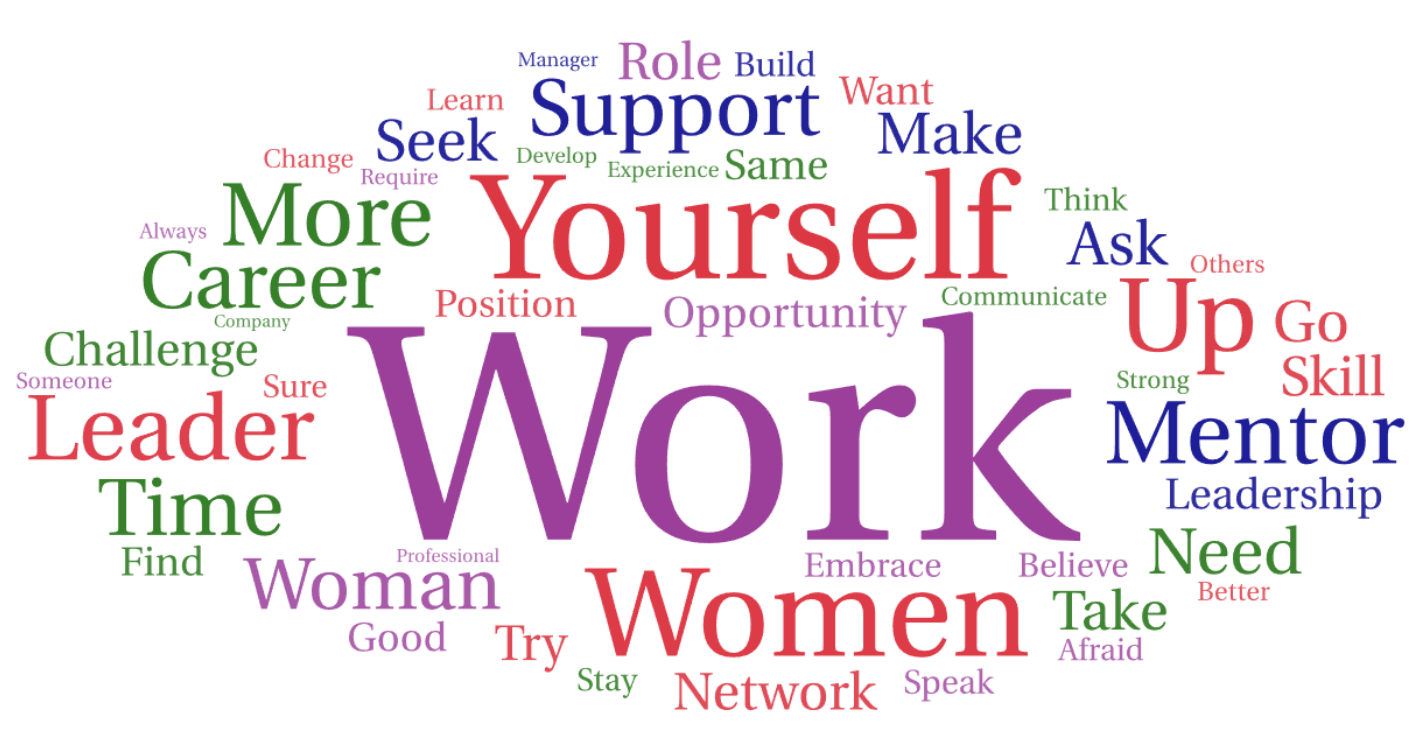IP’s most influential women offer career tips for aspiring leaders

- IP’s most influential women offer advice to aspiring leaders
- New skills, mentorship and perseverance are key goals and attributes
- Knowing what not to do is equally important
The journey to leadership can be long and daunting, but words of wisdom from those who are already at the top of their game can serve as encouragement and support for others.
In honour of this week's International Women’s Day, WTR and sister platform IAM surveyed 26 of the most influential women in intellectual property, to hear their experiences climbing the ladder of success.
In a four-part series, women in IP leadership roles including the director of the USPTO, the CEO of IPwe and the chief IP counsel at Ocado reveal what led them to a career in intellectual property, the hardships they have overcome to rise to the top, and the changes they would like to see in the industry.
Here, they share their advice to any woman in a more junior role aspiring to a position of leadership. We present their eight top tips for becoming a leader in the IP field.
Keep developing new skills
One way to continue progressing is to look inward and focus on personal development. For instance, young professionals should build strong expertise and knowledge by:
- investing in continuous learning;
- staying updated with the latest developments;
- attending relevant seminars and workshops; and
- obtaining certifications.
“Focus on honing your skills and becoming a subject matter expert in your area of interest within the IP field. Building a strong foundation of knowledge and expertise will enhance your credibility and prepare you for leadership roles,” says Bárbara Castro e Silva, senior IP analyst at Mercado Libre.
Beyond these professional skills, being a leader requires learning – and mastery of – ‘soft skills’, notes Xiaomi senior licensing director Na Wei. These can help candidates “stand out more easily” in their career, she says.
Developing strong communication skills is particularly important. “Effective communication is crucial for any leader. Work on improving your ability to express ideas clearly, listen actively and provide feedback constructively,” says Lingling Cui, general manager of the patent department at Baidu. To do this, she suggests attending workshops or courses, and practising communication skills in daily interactions.
Seek mentorship
A good mentor will help to provide support and guidance, as well as champion career development and offer sponsorships to junior IP professionals.
“Find a mentor to whom you can talk and ask questions regarding requirements and get information on how to approach different situations,” urges Maria Mellgren, IP director at Essity.
“When talking and exchanging experiences with women who already occupy leadership positions, you will realise that women have a lot to teach each other. We often go through the same experiences throughout our careers,” adds Castro e Silva.
Mentors can be of any gender, though, notes Kimberly Tey, IP specialist at Maxis. “Diversity, even in perspective, makes you a better person and leader,” she says.
While mentors will often be more senior, with a good understanding of their mentee’s abilities and capabilities, it is also important to find mentors who do not work in the same company, says Patricia Dyck, vice president of legal at Takara Bio. “There will be times when you work for people who do not have interests aligned to you and you need to rely on your network for support,” Dyck says.
One way to build this wider network is to join professional organisations or women's networks. Here, you can learn from other successful women leaders, says Cui. Networking not only helps to build connections but can also open doors to create further opportunities for growth.
Embrace opportunities
Opportunities to take on new responsibilities, projects and leadership roles may be difficult to come by, but women should actively seek them out. “Grab every opportunity,” urges Rosaria Stramandinoli, head of intellectual property at Nutromics. Doing this can help to:
- gain valuable new experiences;
- build confidence;
- showcase skills and capabilities; and
- demonstrate ability to handle pressure and responsibility.
Leadership often requires stepping out of your comfort zone and taking on new challenges, notes Cui. “Don't be afraid to take risks or volunteer for projects that align with your career goals,” she encourages.
“Do not say ‘no’ to anything. Face challenges head on,” says Avanci vice president Marianne Frydenlund. Be brave enough to step outside your comfort zone, adds Mang Zhu, vice president and head of intellectual property at Interdigital.
“Focus on the opportunities put in front of you, rather than the problems and challenges, and approach these with a solution-focused and can-do mindset,” suggests Anna Olsen, global director of intellectual property at Treasury Wine Estates.
What does this look like in practice? “Confidently apply for a role even if you match 40% to 50% of the requirements,” says Chandni Agarwal, Google’s head of portfolio tech advisers and international strategy. “A study shows that women only apply for jobs where they match 80% to 90% of the criteria, whereas men apply when they like a job in spite of the criteria. We need to stop self-filtering.”
“You are smarter than you might think. Don't sell yourself short,” Van Nguy, assistant general counsel at Waymo, insists. Have faith that other candidates are not better than you, says Wei.
Be proactive
One way to proactively seek opportunities is to self-advocate. “Don’t be afraid to speak up about your career aspirations and seek promotional opportunities,” says Castro e Silva. For instance, clearly set an ambition and discuss that openly with managers, Mellgren suggests. “Align on what you need to develop and how your manager can support you. Ask for help,” she urges.
And keep asking. “Whether it’s for a mentor, or for an opportunity, make the ask,” encourages Kathi Vidal, undersecretary of commerce for intellectual property and director of the USPTO. “If the answer is no, don’t take it personally.”
Women can also try to create visibility about themselves and their work through networking. Women can be at risk of keeping their “heads down”, Agarwal warns. It is great to “do a lot of work, and go home”, she says, “but we also need to ensure we are creating the right visibility for ourselves. Always remember – it is not bragging if it is based on facts.”
“Do not be afraid to show and share your knowledge,” adds Tessa Malamud-Cohen, director of group patents in the global IP department at Ferring Pharma.
Wei agrees. “Speak your mind,” she insists. “Never shy away from saying ‘I can do this’ or ‘I am qualified for this leadership position’”.
At the same time, women can take the lead before they have a title that recognises the fact. “Throughout my career, when I saw a problem or opportunity to do better, I always took it upon myself to lead change,” Vidal reflects. “That made me a natural pick for early leadership and gave me the skill set to hit the ground running.”
Speak up
Anne McAleer, head of intellectual property at Paragraf, has been inspired by younger women she works with, too. “They are more determined to speak out than I was at their age and less inclined to put up with things that aren't right,” she notes. “The older generation should learn from the younger generation too.”
To this end, Ocado chief IP counsel Lucy Wojcik asks women to challenge all levels of discrimination. “Whilst often not done with bad intention, unless it is pointed out and changed, it is difficult to challenge the bigger issues should they come,” she explains.
In short, “stand up for what you believe in”, Alida Lundqvist, patent unit director at Ericsson, says. This includes speaking up for others. “Caveat and then share their perspective,” Nguy suggests.
Support other women
While women can struggle to reach positions of leadership in the IP field, it is not a case of there being limited space. There is a false narrative that women need to compete with each other in order to succeed. “Too often, our challenges come from each other,” Olsen laments.
Things are improving. But again, there is a misconception that this is cause for competition. “Be supportive and happy that the times have changed for the better for all of us, such that another woman can advance without having to suffer the same way you did,” says Via LA’s chief licensing officer, Jane Bu.
“If [women] are half of the workforce, by being more supportive of another woman, we can improve women in IP's advancement by 50%,” Bu continues. “Be kinder, supportive and more empathic to that other woman.”
Such gestures will then be passed on. “Women will see that and in turn, support you,” Frydenlund points out.
“Relationships are a woman’s superpower,” Vidal insists. “Use that. Grow it. Find ways to lift others as you climb.”
Be yourself
Many of the women we spoke to underscored the importance of being true to yourself. “You should not have to pretend to be something you are not to advance your career,” Wojcik insists.
Here, many have advice on what not to do.
“Don't let pressure to conform force you to lose your identity or individuality (or your confidence), particularly in more traditional or male-dominated environments,” says Olsen.
“Do not adapt to other requests on how they think you should be or act,” Frydenlund cautions. This includes “imitating men”, Lundqvist warns. “Do not make yourself into someone you are not in order to advance in your career,” she urges.
“Do not try to copy someone else and their style,” Mellgren reiterates. “Figure out why you want to be a leader and how you wish to be perceived as a leader and remind yourself about this when you encounter tough situations.”
Finding and developing your own unique leadership style is invaluable. “Your different perspective or approach to an issue can be an asset,” explains Nguy. “Embrace the fact that your leadership style may not adhere to ‘prescribed norms’ and the stereotypical archetype of a leader,” Tey says.
Indeed, women are encouraged to be authentic and stay true to their core values. “You can succeed while being yourself,” Olsen points out. “Believe in yourself and your capabilities,” adds Lundqvist. “Be firm in your convictions at work. Do what you think is right, even if it’s not popular,” says IPwe CEO Leann Pinto.
Don’t give up
Finally, our leaders conclude: never give up. “Do not give up if this is what you dream to do,” urges Pinto. “We will not overcome implicit bias if we do not continue to prove ourselves as adept in these [leadership] roles.”
“Don't give up because you didn't get the same outcome or result by doing the same things as other more successful women,” adds Bu. “We come in all shapes, sizes, races, religions, educational and socioeconomic backgrounds. Your path will always be your own – so, don't be afraid to think outside of the box and be that ‘positive and optimistic’ newcomer.”
It may be a long journey. Thus, patience is paramount. But at the same time, Dyck reminds younger women to remain “physically, emotionally and mentally healthy” and to set boundaries on their time. “Know your worth,” she insists. “It’s okay to go the extra mile and work hard. But make sure that you have reasonable limits. If you don't respect yourself, nobody else will.”
“Believe in yourself, be resilient, be persistent,” urges Karen Wang, associate general counsel at Western Digital Corporation. Trust that you can do it, continues Gabriele Mohsler, vice president of patent development at Ericsson.
But simply working harder does not guarantee open doors. “Work smarter, not harder,” Bu advises. “Many of us have been told all our life, ‘If you didn't get what you want at work, stop complaining and just work harder.’ That is not the right answer,” she warns.
For one, it is important to prioritise “a respectful, healthy company culture”, says Diane Gabl Kratz, director of IP strategy and operations at Dolby Laboratories. She tells women that it is better to leave a company than attempt to change a toxic workplace. “Unless you are a C-level executive, you probably do not have the power to improve an entire organisation's culture,” she notes. “Even if you could, it is not a good use of your time to fight that uphill battle.”
It is also important to prioritise what matters most to you. “Be very clear on why you want to attain a position of leadership,” Percipience LLC founder Suzanne Harrison notes. “Many women who get to the top don't necessarily like being there as it can be isolating, focused on managing people instead of doing the work, and comes with a lot of stress and pressure. If you truly want that, then go forward. If not, examine what you do want and then go after that.”
Striking a healthy work-life balance is crucial. But this can be a challenge, particularly for women with family commitments. “Work the hours needed to get promoted. This will require you, at times, to let down your family and, at other times, to let down your boss. Be prepared for disappointment as you try to successfully navigate two demanding positions. Be clear about work and homelife boundaries and be ready to communicate that to your management if needed,” says Harrison.
“Leadership is a journey, and it takes time, effort and perseverance to achieve your goals,” Cui summarises. “Stay focused, stay true to yourself and don't be afraid to ask for help when needed. With these tips, I believe you will be well on your way to becoming a successful leader.”
The most common words used in advice offered

WTR/IAM Women in IP survey
The responses in this article came from a survey conducted by WTR and sister platform IAM between 26 January and 18 February. The survey was sent to 26 women with significant experience in intellectual property across Europe, the Americas and the Asia-Pacific region. The views, information and opinions expressed are solely those of the respondents involved and do not necessarily reflect those of their respective organisations.
WTR and IAM would like to thank the following individuals, as well as one anonymous participant, for taking part in this research:
- Chandni Agarwal, head of portfolio tech advisers and international strategy, Google
- Jane Bu, chief licensing officer (former general counsel), Via LA
- Bárbara Castro e Silva, senior IP analyst, Mercado Libre
- Lingling Cui, general manager of patent department, Baidu
- Patricia Dyck, vice president of legal, Takara Bio
- Liz Eadie, executive manager of intellectual property, CSIRO
- Marianne Frydenlund, vice president, Avanci
- Diane Gabl Kratz, director of IP strategy and operations, Dolby Laboratories
- Suzanne Harrison, founder, Percipience LLC
- Alida Lundqvist, patent unit director, Ericsson
- Tessa Malamud-Cohen, director of group patents in the global IP department, Ferring Pharma
- Anne McAleer, head of intellectual property, Paragraf
- Maria Mellgren, IP director, Essity
- Gabriele Mohsler, vice president of patent development, Ericsson
- Ayumi Nishino, lead IP counsel and senior director, NEC
- Van Nguy, assistant general counsel, Waymo
- Anna Olsen, global director of intellectual property, Treasury Wine Estates
- Leann Pinto, CEO, IPwe
- Rosaria Stramandinoli, head of intellectual property, Nutromics
- Kimberly Tey, IP specialist, Maxis
- Kathi Vidal, undersecretary of commerce for intellectual property and director of the USPTO
- Karen Wang, associated general counsel, Western Digital Corporation
- Na Wei, senior licensing director, Xiaomi
- Lucy Wojcik, chief IP counsel, Ocado
- Mang Zhu, vice president and head of intellectual property, Interdigital
